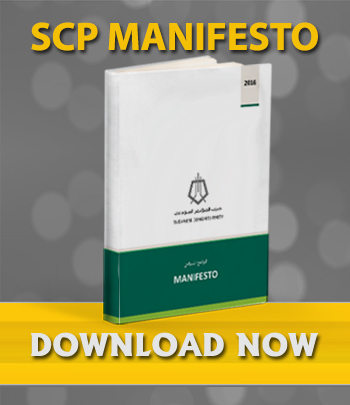EDUCATION
Education is a human right and the basis of the progress of people and societies. The Sudanese Congress Party is totally committed to realizing this project of modernization and cognitive renaissance and to achieve these developmental goals both ideologically and dynamically. The education process is concerned with the raising of generations and works to impart the tools of scientific knowledge in theory and practice in order to bring about social change and the development of society. Therefore, we view education as the actual foundation of the Renaissance project through two components:
● Quantitative component: Free and compulsory education and fairness in the distribution of opportunities for proper
education
● Qualitative level: To prepare programs, courses, educational stages and educational methods on a scientific basis
consistent with the achieving the strategic vision of the State with the addition of a national education curriculum for all
levels and to educate students on respect for society and the law. With the incorporation of human rights principles and
local languages as additional materials in different stages of education..
Attention must be paid to professional and technical education and to increase it proportionally to cover the practical requirements of the economic, social and cultural renaissance of the country.
The Sudanese Congress Party views it as follows:
In the field of public education:
● Free and compulsory education in the primary stages.
● Free secondary education.
● Linking education to development needs and the labor market.
● Introduce local languages as taught languages in the primary stages.
● Equality in the provision and distribution of proper educational conditions, for example, the number of pupils in the
classroom should be equal throughout the Sudan and the teachers should be at the same level of competence and
with the provision of the same educational resources within the classroom.
● Educate students to respect themselves, respect others, and respect productive work, and to provide them with
knowledge of their environment, heritage and history by scientific means, and to prevent all forms of oppression and
cultural discrimination prevalent in education since the establishment of the Sudanese State in its present form.
● Education should be scientific, in the sense that students should study scientific theories and scientific research
methods in modern scientific ways that make them able to innovate.
In the field of higher education:
Higher Education Institutions are scientific institutions with the specific task of equipping the individual with the necessary knowledge and tools in their specialized professional or research field, our party gives these institutions our utmost attention and therefore we adopt the following policies with regards to institutions of higher education.
● To be independent institutions which operate freely and without restriction.
● Free study in public universities with the provision of housing, subsistence and the essentials of a decent life for
university students.
● Rehabilitation and development of these institutions and support for them financially.
● Taking into account the proportional representation of the population in higher education.
● To abolish Arabization in universities and replace this with policies that provide real opportunities for all groups to
learn a second and third language according to the importance of these languages in the world and the course
being learnt, whilst including the Arabic language.
● The establishment of specialized institutions for scientific research with and generous support for existing ones,
and restructuring them in a manner that guarantees both the independence of the scientific research and their
democratic administration.
● To incentivise skilled scientists and improve their circumstances and enable them to influence administrative and
political decisions and provide them with material and moral incentives for any scientific or technical achievement
in order to preserve the existing talent and stimulate expatriate Sudanese thinkers to return and contribute to the
national renaissance.
● Linking the skilled minds in scientific research institutions or in universities with centres of production such as the
agricultural, animal and industrial sectors.
● Develop programs with research priorities whilst providing them with sufficient funds in coordination with
research institutions and universities.
● Provide training and qualification opportunities in foreign educational institutions and universities and to
encourage delegations and scientific visits so as to link national talent with the latest achievements in science
and technology.
● Subsidising book prices, reducing the cost of printing, and exempting scientific and cultural products and their
inputs from duty payments.
● Open the country to international scientific publications and encourage and support local publications.


